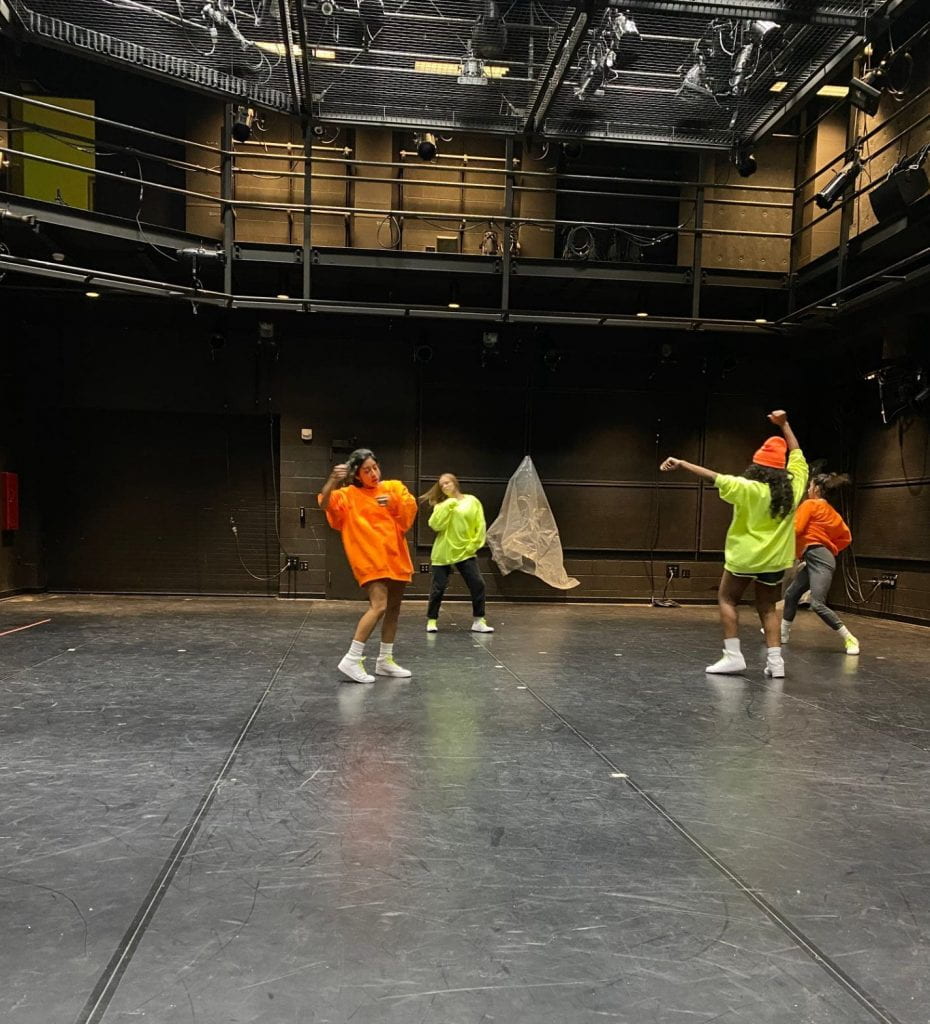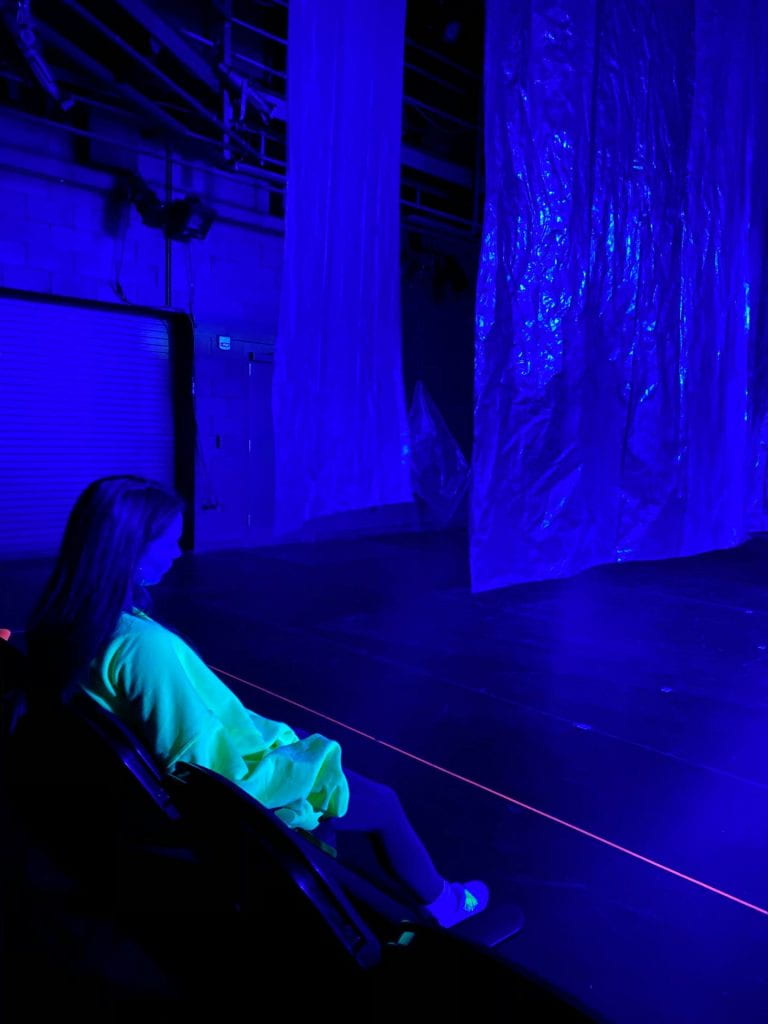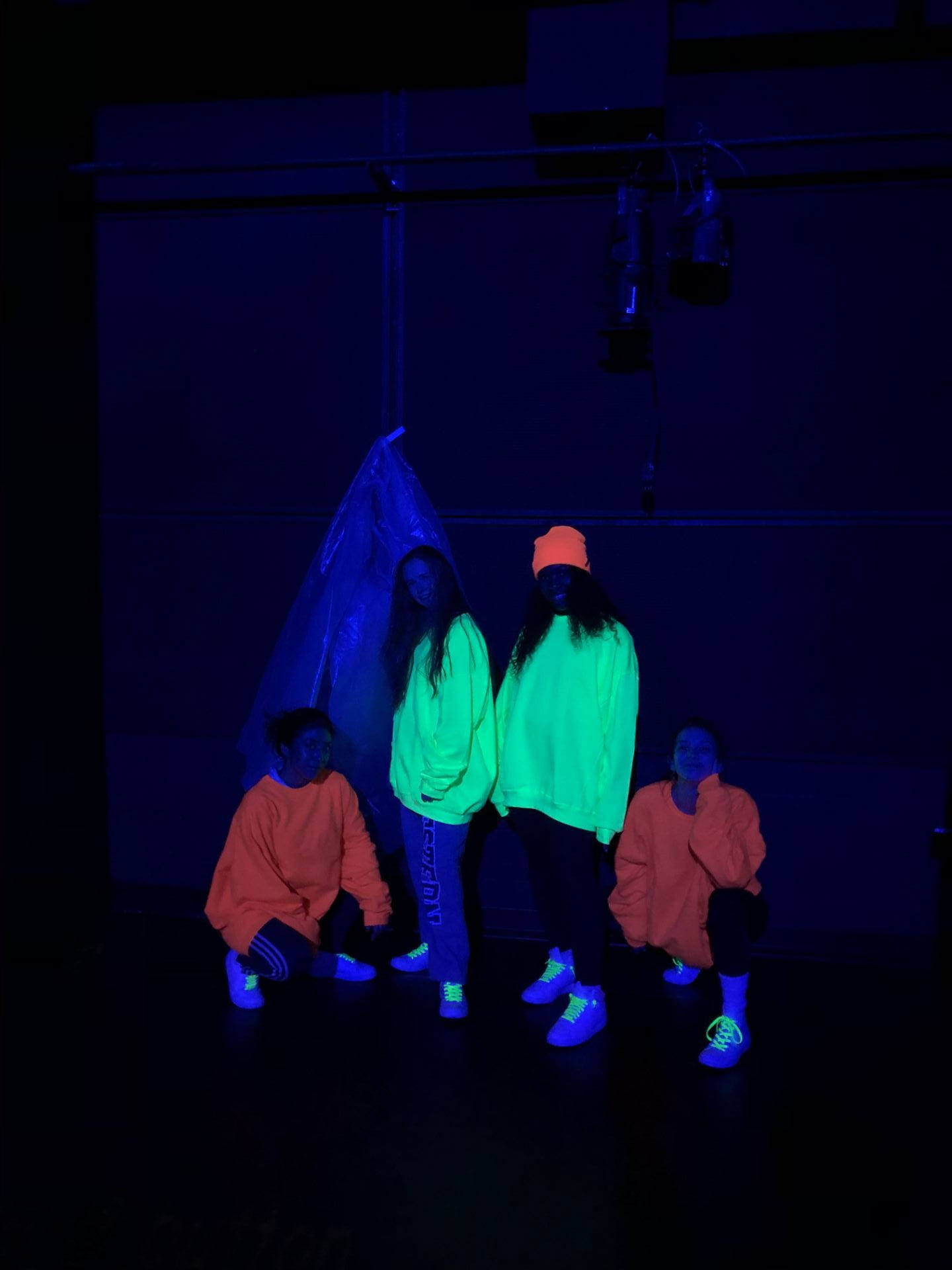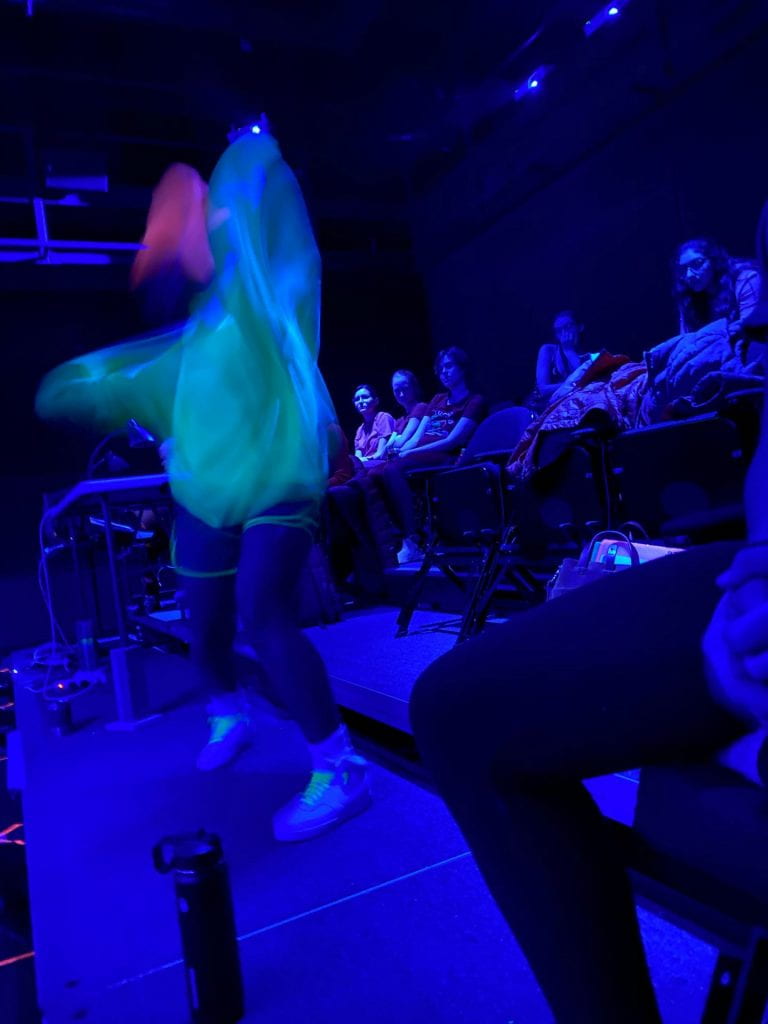Jess Rodriguez (Whitman '20), Tasia Wu (Whitman '22), Grace Fashanu (Whitman '22), and Neave Fleming (Whitman '23) will be performing in jess pretty's piece in "MMMM."
Melina Waldman. What has been the biggest challenge in the rehearsal process so far?
Grace Fashanu. I mean obviously it’s dancing, but it’s way more physically demanding than I expected it to be. Like we work everyday for at least three hours, on the weekends it’s more, Fridays it’s four hours, Sundays it’s five. jess is like really amazing and intense, we roll around on the floor and get up and do the same thing again and we just dance for big chunks of time so my body is sore all over, all the time. It’s extremely physically demanding but it’s a good time.
Neave Fleming. …[the biggest challenge] is when I’m not feeling up for rehearsal and up for dancing, but once I get there and start moving it’s awesome and I’m so glad that I’m there. I think also… the improv and starting to feel comfortable with that part of it–that’s been a challenge and I’m definitely still not there yet. What she’s having us do is not so much perform for the audience but have them come into your space, what you’re doing, so that’s different than anything I’ve done before. So it’s been kind of challenging but really cool too.
 MW. Can you give me your own definition of the words ‘sensation’ and ‘pleasure’ and then describe how those themes are applied in the work?
MW. Can you give me your own definition of the words ‘sensation’ and ‘pleasure’ and then describe how those themes are applied in the work?
GF. I think sensation is… the feeling you get when something happens. I think it [connotes] a pleasurable experience, and so I think sensation oftentimes is hand-in-hand with pleasure and the idea of satisfaction. So all the things we’re doing in our dance is about how those things can express itself on one’s body and what it means to desire something and reach for that thing… It all deals with very deep, intense feelings that are not always so apparent, but it’s work to get to.
NF. … the audience is there for you and to see you, but you’re also in your own space. Like this is your place to be and you are doing you, however that might be. That’s why we are doing a lot of improv in the piece and a lot of experimenting…the whole time we’re dancing is basically just experiencing different sensations and listening to the music and finding pleasure in the music and in the space with the other dancers. It’s very focused on you, like what do you need? What do you want? And how are you going to execute that through movement? Not for the audience but for you.
MW. Can you point to a favorite part of the process so far?
GF. jess has us do this thing where we write down our dreams. At first it was very odd, I was like ‘why are we writing down our dreams? This is so weird’ but it… forces you to think a little more deeply about what happens when you’re unconscious and what your mind goes to, and also this idea of fantasy and things that are intangible and so disconnected that they’re delicate. So I think it’s really cool that we’re able to explore that, and a lot of what jess is constructing is about how close dreams are to nightmares and how often those lines get blurred… After we write down our dreams, we go into the dancing and she asks us to think about our dreams and how we can incorporate that into the dancing. The other day, she had us make up ten gestures, as she called it, based off of our dreams and we just broke it and tore it apart and just made something absolutely beautiful and unrecognizable.
NF. I honestly love working with the people in the piece…Movement is very vulnerable by nature I think, and so opening that up in this space, with these people, has been really cool…Like last night for example, I was really exhausted…and being in the environment that jess and the other dancers are creating helped me feel more grounded last night and more in myself. I was like–okay, here I am! Which was pretty great…I leave every night and I’m just smiling ear-to-ear.
Go off Neave Flemming! (Whitman ’23)

Ashlyn Quintus. How has this process been different than other dance or creative projects you have worked on in the past?
Jess Rodriguez. See that’s why this is funny because this is my first time ever doing…a dance show of any kind and so… I didn’t really know what to expect… She [jess pretty] had two choreographed sessions where she did some modern trap and modern hip hop stuff and I just thought it was fun….working with her is insane. It’s beautiful. It’s so beautiful. I don’t know what I expected but I didn’t expect what she’s doing. We’ve been really working on creating and owning the space and she’s really empowering that way…We watched some films like Beyonce’s Homecoming to mentally prepare what we’re gonna do…How she talks to us is so empowering that it doesn’t even feel like I’m doing a dance show, it feels like five women coming together and hyping each other up.
AQ. In the description for MMMM I was caught by the production’s strive to include themes of “sensation” and “pleasure”. How would you describe those terms in your own words? What about MMMM as a whole?
JR. Yeah, sensations and pleasure, but not in that explicit way. We are really feeling the movements of the piece and feeling what our desires and what our spaces we want to create are…A lot of that has to do with pleasure I guess—a lot of that is centered around dreams. That could be bad dreams and good dreams…Like what does it feel like and what does it look like to be in a dream and what kind of dream are you creating.
Tasia Wu. We have a cast of four and she’s using us as research for her further performance that’s going to be happening in April…The idea behind this initial performance was her solo…as if in a dreamlike world, what would the world be like if it was just for her and everything revolved around her, her actions and desires? And in doing so, during the process, she makes us do little free-writes about what dreams we’ve had. Then it also borders within these dreams…it has as a very fine line what could be nightmares, so it’s interesting this contrast of like this world shaped to us yet with our dreams and the reality of like what is in our dreams and the possibility of them turning into nightmares… I think it crosses that line of like it being pleasure and finding the good in it, and yet, it does have this double entendre of like that nightmare aspect, so I guess it isn’t all just pleasure and sensation all the time.
AQ. What has been the largest challenge during your rehearsal process so far?
JR. Omg I, I thought I was good at learning choreography because I lead Zumba or whatever and like I—I was like “I got this” but she moves so fast—she moves so fast. But it’s also good because she breaks it down really well. That’s just been an interesting thing to work with and be challenged by in a different way…Another thing is what I’ve described earlier… I’ve never done a show of any kind really… I guess mentally preparing that people are gonna see it, that people are gonna be there is kinda a scary thing but also the way we’ve been creating the space makes me feel so confident in the space. I guess its just challenging to remember this is a performance when I feel so comfortable in a space, like with these people and that people are gonna watch, people are gonna be right there…
TW. Besides the time commitment, jess has been pushing us in this improv mental state… the improv is in regard how what we do and how we investigate whatever movement our body wants but also by staying completely present in our bodies… she’s also pushing our boundaries of like when we reach a point of exhaustion and where we go from there with the necessity of still needing to move… through all that she’s also been pushing the thought of throwing away of our concepts of “performing” for people… I think crossing these boundaries are something I’ve never experienced before in my dance career.
AQ. Can you name and describe an ‘aha’ moment that has informed or altered your approach to this piece for the rest of the production process?
JR. Yeah. Jess said something to me—so my major is sociology, so I’m what they call soc-braining or whatever, and [it’s] when you analyze a situation really hard and when you think about all the things contributing to what’s happening, and I kinda do that with a lot of different things…in learning movements I can be pretty “so this needs to happen so I can do this” and jess said something to me. She said “paralysis in analysis” because I was getting too focused on getting every step right rather than letting by body just flow through just the general movement of what was happening…She said that and I was like that is applicable to literally every situation that I put myself in. You know when you analyze a situation so hard rather than letting it happen, just letting it happen as it’s going to happen, and so that was really a moment like ‘OK. I’m in this. I auditioned for this. I got this.’
"MMMM" opens this Thursday, November 14 - Saturday, November 16 @ 8 PM, and Saturday November 16 - Sunday, November 17 @ 2 PM. Buy your tickets online HERE or at hjt Box Office open 12 - 4 PM; M - F (509) 527-5180.


Can you be more specific about the content of your article? After reading it, I still have some doubts. Hope you can help me.